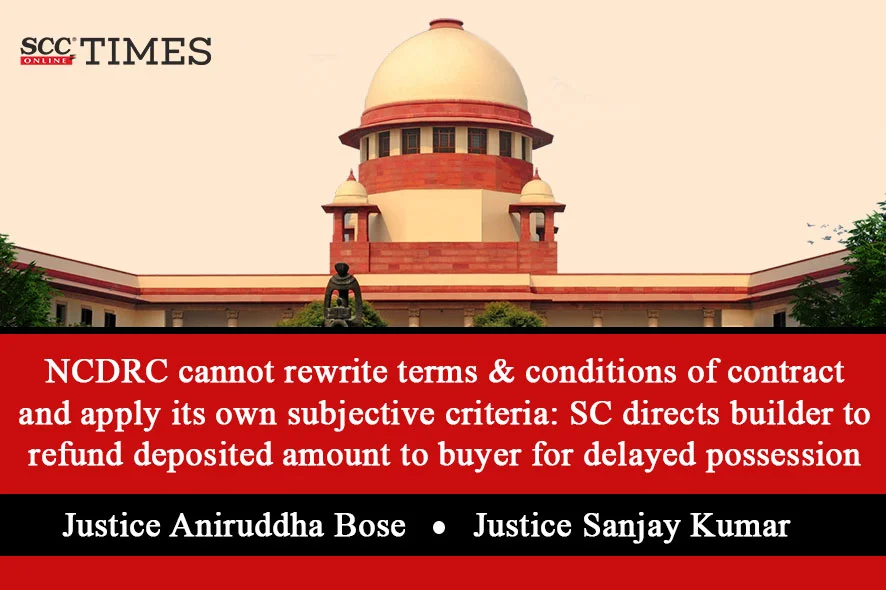Supreme Court: In an appeal against the order of the National Consumer Disputes Redressal Commission (‘NCDRC’), filed for appellants right to terminate the sale agreement and claim unconditional refund of the total amount paid by him with interest for the property, the division bench of Aniruddha Bose and Sanjay Kumar*, JJ. while setting aside the impugned order, held that the NCDRC overstepped its power and jurisdiction in ignoring the binding covenants in the agreement and in introducing its own logic and rationale to decide as to what the future course of action of the parties should be.
Background:
The appellants intended to purchase an apartment in a building to be constructed by the Lodha Crown Buildmart (‘company’) at New Cuffe Parade. The parties executed an agreement to sell. As per the agreement, possession of the apartment was to be delivered to the appellants for fit outs by 30-06-2016 or, with a grace period of one year, by 30-06-2017. Alleging that the company had not delivered possession of the apartment for fit outs by the said date and that they had terminated the agreement, the appellants approached the NCDRC. Their prayer was for refund of the amount paid by them with compound interest thereon at 18% p.a. along with compensation for the harassment, mental agony and torture suffered by them, apart from litigation cost.
NCDRC order
NCDRC noted that there was ‘some delay’ in handing over of possession of the apartment by the company, but opined that it was not ‘unreasonable’, whereby the appellants could cancel the Agreement and seek a refund. The NCDRC further opined that if they wish to seek a refund, the company was entitled to deduction/forfeiture of the earnest money as per the agreement’s provisions. It also observed that the company was still bound to provide actual physical possession of the apartment, complete in all respects.
Analysis:
The Court took note of the terms and conditions which were arrived at by and between the parties. It took Clause 11 and 21 of the agreement and said that that the company was to deliver possession of the apartment to the appellants for fit outs by 30-06-2016 but grace period of one year was provided under Clause 11.2, whereby the date for delivery of such possession stood extended till 30-06-2017.
Further, it noted that Clause 21.u indicates that the works in the apartment, so far as the company is concerned, were to be completed by that date and the apartment was to have regular water and electricity supply, apart from lift access, and the appellants could carry on interior and other related works therein. Further, as per Clause 11.1, the company was required to obtain the Occupation Certificate in respect of the apartment and make available the key common areas and amenities in the building within one year from the date of offer of possession for fit outs. That was deemed the final possession of the apartment in terms of Clause 11.2. This date for delivery of final possession was also extendable by one year, i.e., up to 30-06-2018.
It also noted that, by letter dated 29-11-2017, the company informed the appellants that their apartment was ready for possession and called upon them to make the payment due at the earliest to enable the process to hand over possession being initiated.
The Court said that once the parties committed themselves to a written contract, whereby they reduced the terms and conditions agreed upon by them to writing, the same would be binding upon them. In the event such a written contract provided for the consequences that are to follow in the event of breach of the conditions by one or the other of the parties, such consequences must necessarily follow and if resisted, they would be legally enforceable.
The Bench further said that the agreement stipulated the date of delivery of possession of the apartment for fit outs with a grace period of one year. Thus, the date for delivery of possession of the apartment for fit outs, with the grace period, was 30-06-2017. As the company did not offer delivery of possession of the apartment for fit outs by that date. The ‘date of offer of possession’, under Clause 1.14, linked with issuance of the ‘Occupation Certificate’ was distinct and separate from the ‘date of delivery of possession for fit outs’.
Further, it said that Clause 11.3 unequivocally provided the consequences in the event of delay in that regard. The right of election given thereunder to the appellants to either continue or to terminate the agreement within ninety days from the expiry of the grace period was absolute and it was not open to the NCDRC to apply its own standards and conclude that, though there was delay in handing over possession of the apartment, such delay was not unreasonable enough to warrant cancellation of the agreement. It was not for the NCDRC to rewrite the terms and conditions of the contract between the parties and apply its own subjective criteria to determine the course of action to be adopted by either of them.
The Court held that the NCDRC overstepped its power and jurisdiction in ignoring the binding covenants in the agreement and in introducing its own logic and rationale to decide as to what the future course of action of the parties should be.
The Court set aside the impugned order, as the appellants did not choose to act upon the belated offer of the company, in its letter dated 29-11-2017, and are still intent on terminating the agreement as per Clause 11.3 of the Agreement. Further, it directed the company to refund the deposited amount of Rs. 2,25,31,148 in twelve equal monthly installments, through post-dated cheques, with simple interest thereon at 12% p.a., from the date of receipt of the said amount or parts thereof till actual repayment.
[Venkataraman Krishnamurthy v. Lodha Crown Buildmart (P) Ltd., 2024 SCC OnLine SC 182, decided on 22-02-2024]
*Judgment Authored by: Justice Sanjay Kumar







